CAIRO, Egypt – The Muslim call to prayer fills the halls of a Cairo computer shopping center, followed immediately by the click of locking doors as the young, bearded tech salesmen close shop and line up in rows to pray.
Business grinding to a halt for daily prayers is not unusual in conservative Saudi Arabia, but until recently it was rare in the Egyptian capital, especially in affluent commercial districts like Mohandiseen, where the mall is located.
But nearly the entire three-story mall is made up of computer stores run by Salafis, an ultraconservative Islamic movement that has grown dramatically across the Middle East in recent years....
Critics worry that the rise of Salafists in Egypt, as well as in other Arab countries such as Jordan and Lebanon, will crowd out the more liberal and tolerant version of Islam long practiced there. They also warn that the doctrine is only a few shades away from that of violent groups like al-Qaida — that it effectively preaches "Yes to jihad, just not now."...
Salafist groups are gaining in numbers and influence across the Middle East. In Jordan, a Salafist was chosen as head of the old-guard opposition group, the Muslim Brotherhood. In Kuwait, Salafists were elected to parliament and are leading the resistance to any change they believe threatens traditional Islamic values.
The growth of Salafism is visible in dress. In many parts of Cairo women wear the "niqab," a veil which shows at most the eyes rather than the "hijab" scarf that merely covers the hair. The men grow their beards long and often shave off mustaches, a style said to imitate the Prophet Muhammad.
The word "salafi" in Arabic means "ancestor," harking back to a supposedly purer form of Islam said to have been practiced by Muhammad and his companions in the 7th century. Salafism preaches strict segregation of the sexes and resists any innovation in religion or adoption of Western ways seen as immoral....
Its preachers often glorify martyrdom and jihad — or holy war — but always with the caveat that Muslims should not launch jihad until their leaders call for it. The idea is that the decision to overturn the political order is up to God, not the average citizen.
The Salafi way contrasts with the Islam long practiced in Egypt. Here the population is religious but with a relatively liberal slant. Traditionally, Egyptian men and women mix rather freely and Islamic doctrine has been influenced by local, traditional practices and an easygoing attitude to moral foibles.
But Salafism has proved highly adaptable, appealing to Egypt's wealthy businessmen, the middle class and even the urban poor — cutting across class in an otherwise rigidly hierarchical society.
In Cairo's wealthy enclaves of Maadi and Nasr City, robed, upper-class Salafis drive BMWs to their engineering firms, while their wives stay inside large homes surrounded by servants and children.
Sara Soliman and her businessman husband, Ahmed el-Shafei, both received the best education Egypt had to offer, first at a German-run school, then at the elite American University in Cairo. But they have now chosen the Salafi path.
"We were losing our identity. Our identity is Islamic," 27-year-old Soliman said from behind an all-covering black niqab as she sat with her husband in a Maadi restaurant.
A dozen satellite TV channels, most Saudi-funded, are perhaps Salafism's most effective vehicle. They feature conservative preachers, call-in advice shows and discussion programs on proper Islamic behavior.
Cairo's many Salafist mosques are packed on Fridays. Outside Shaeriyah mosque, a bookstall featured dozens of cassettes by Mohammed Hasaan, a prolific conservative preacher who sermonizes on the necessity of jihad and the injustices inflicted on Muslims.
Alongside the cassettes, a book titled "The Sinful Behaviors of Women" displayed lipstick, playing cards, perfumes and cell phones on the cover. Another was titled "The Excesses of American Hubris."
Critics of Salafism say it has spread so quickly in part because the Egyptian and Saudi governments encouraged it as an apolitical, nonviolent alternative to hard-line jihadi groups.
12 years ago






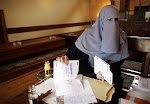
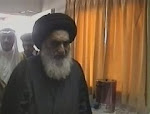

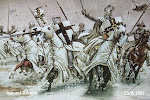



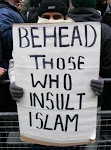

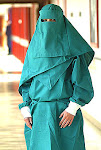






No comments:
Post a Comment